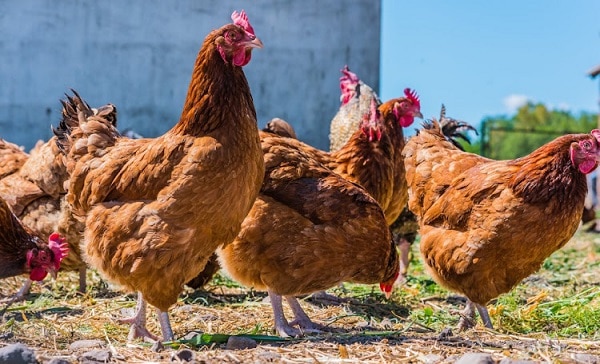A Comprehensive Guide to Chicken Farming in South Africa – Starting a chicken farm involves several steps, including:
- Planning: Determine the type of farm you want to run (e.g., small-scale backyard operation, commercial egg or meat production), the size of your flock, and the resources you have available (e.g., land, buildings, equipment).
- Obtaining birds: Choose a breed of chickens that is suitable for your intended use (e.g., egg production, meat production, or dual-purpose breeds). Obtain your birds from a reputable hatchery or breeder.
- Housing: Provide a safe and secure living environment for your birds. You will need to build or purchase a coop and run that protects the birds from predators and provides them with shelter, ventilation, and access to food and water.
- Feeding: Provide your chickens with a balanced diet that includes all the necessary nutrients. You can buy commercial feed or make your own feed mixture.
- Watering: Ensure that your chickens have access to clean water at all times.
- Health Management: Keep your birds healthy by regularly monitoring their health, providing preventive care, and quickly treating any diseases or illnesses that occur.
- Waste Management: Manage chicken waste to minimize odors, flies, and other health hazards. You can compost the waste or use it as fertilizer.
- Marketing: Decide how you will sell your eggs or meat, whether directly to customers or through a distributor.
By following these steps and staying organized, you can successfully run a chicken farm.
You need a Chicken farm business plan
A chicken farm business plan is a written document that outlines the details of your chicken farming operation. It should include the following components:
- Executive Summary: A brief overview of the purpose of the plan and key points covered in the plan.
- Business Description: An explanation of the type of chicken farming business you are starting, the products or services you will offer, and the target market you will serve.
- Market Analysis: A study of the chicken farming industry, including a description of the target market, competitors, market size and growth, and trends.
- Marketing and Sales Strategies: A description of your marketing and sales approach, including pricing, advertising, and distribution channels.
- Operations Plan: A description of the day-to-day operations of the chicken farm, including the facilities, equipment, and personnel required.
- Management Team: A description of the skills and experience of key personnel, including the owner, manager, and staff.
- Financial Projections: A detailed financial plan, including projections for startup costs, operating expenses, revenue, and profitability.
- Appendices: Any additional information, such as supporting documents, market research, and data analysis.
By creating a comprehensive and well-researched business plan, you can attract investment and establish a successful chicken farm.

Choose a breed of chickens
Choosing the right breed of chickens for your operation depends on your goals and the conditions in which you plan to raise them. Here are some popular chicken breeds to consider:
- Leghorn: This breed is known for its efficient egg production, making it a good choice for commercial egg production.
- Rhode Island Red: Rhode Island Reds are hardy, dual-purpose birds that are good for both meat and egg production.
- Plymouth Rock: Plymouth Rocks are friendly, docile birds that are good for backyard flocks and egg production.
- Sussex: Sussex chickens come in a variety of colors and are known for their egg production, meat quality, and hardiness.
- Orpington: Orpingtons are large, friendly birds that are good for both meat and egg production.
- Brahma: Brahmas are large, docile birds that are good for meat production and backyard flocks.
- Cochins: Cochin chickens are friendly, docile birds that are good for backyard flocks and meat production.
When choosing a breed, consider factors such as egg production, meat quality, hardiness, personality, and adaptability to your climate and conditions.
Correct Housing of Chickens
Housing for chickens is an essential aspect of chicken farming. Here are the key components of a good chicken coop and run:
- Coop: The coop is the indoor living area for the chickens, where they sleep and lay eggs. It should provide shelter from the elements, protection from predators, and adequate ventilation. The coop should have perches for the chickens to sleep on, a nest box for egg-laying, and a cleanable floor.
- Run: The run is an outdoor area that allows the chickens to exercise and forage for food. It should be securely fenced to keep the chickens safe from predators and allow them access to sunlight and fresh air. The run should be large enough to provide enough space for the number of chickens you have, with a minimum of 10 square feet per bird.
- Flooring: The coop and run should have solid flooring that is easy to clean and maintain. A concrete floor or a floor covered in sand or straw is recommended.
- Ventilation: Adequate ventilation is essential to keep the chickens healthy and prevent the buildup of harmful gases. The coop should have windows or vents that can be opened for ventilation.
- Lighting: Chickens need access to natural or artificial light to regulate their circadian rhythms and promote healthy egg production.
- Feeding and watering: The coop and run should have a feeding and watering system that is easily accessible to the chickens and is kept clean and well-maintained.
By providing a well-designed and properly maintained housing system, you can ensure that your chickens are safe, healthy, and comfortable.
Feeding: Provide your chickens with a balanced diet
Chickens need a balanced diet that includes protein, carbohydrates, vitamins, and minerals to stay healthy and produce eggs. Here are some of the common foods given to chickens:
- Grains: such as corn, wheat, and oats, provide carbohydrates for energy.
- Protein: such as soybean meal, fish meal, or meat and bone meal, is essential for growth and egg production.
- Greens: such as grass, kale, or spinach, provide vitamins and minerals.
- Calcium: for strong eggshells, crushed eggshells or oyster shells can be offered.
It’s important to provide clean and fresh water at all times. You can also supplement their diet with scratch grains, vegetables, and fruits as treats. Additionally, commercial laying hen feed is also widely available and formulated to meet their nutritional needs.
Fresh Water for your chickens
Providing clean and fresh water is essential for chickens’ health and well-being. Chickens need water for digestion, absorption of nutrients, and regulation of body temperature. Here are some tips for providing water to chickens:
- Location: Place the water source in a shaded area, away from manure and other sources of contamination.
- Accessibility: Make sure the chickens can easily access the water, and it’s not too high for them to reach.
- Cleanliness: Clean the water containers regularly and refill with fresh water daily.
- Water quality: Provide clean and safe water that is free from harmful chemicals, pollutants, or bacteria.
- Winter care: Make sure the water does not freeze in cold weather, consider using a heated water dispenser or change the water more frequently.
By following these tips, you can ensure that your chickens have access to fresh and clean water at all times.

Waste Management
Waste management is important for keeping your chicken coop and run clean, reducing odors, and preventing the buildup of harmful bacteria and parasites. Here are some tips for managing chicken waste:
- Clean the coop regularly: Remove manure and bedding material daily, and replace with fresh bedding.
- Use appropriate bedding: Use absorbent bedding materials such as straw, sawdust, or pine shavings to control odors and absorb moisture.
- Compost chicken waste: Compost the manure and bedding material in a separate compost pile, away from the coop and run. Composted chicken waste can be used as fertilizer for gardens and crops.
- Dispose of waste properly: If you don’t want to compost, you can dispose of the waste in a landfill, but check local regulations first.
By following these tips, you can effectively manage chicken waste, reduce odors, and maintain a clean and healthy environment for your chickens.
Marketing your Poultry
Marketing chickens can be a way to turn your hobby or small-scale operation into a profitable business. Here are some tips for marketing your chickens:
- Know your market: Research your target customers and understand their needs and preferences.
- Offer quality products: Focus on producing healthy, happy, and high-quality chickens and eggs.
- Branding and packaging: Create a brand and develop packaging that appeals to your target market.
- Marketing and promotion: Use various marketing channels such as social media, online platforms, local events, and word of mouth to promote your products.
- Price competitively: Determine a fair price for your chickens and eggs based on market conditions, production costs, and competition.
- Establish a distribution network: Establish relationships with local stores, restaurants, or distributors to sell your products.
By following these tips, you can effectively market your chickens and grow your business. Good luck!
Aso see how to make your own chicken feed for broilers and layers
YouTube Channel: Farming South Africa
Facebook Page: Farming Life
Back To Home Page: Farming South Africa
Our website is free to use and there has been a lot of work put into it. If you enjoyed the content please subscribe
A Comprehensive Guide to Chicken Farming in South Africa


request more information of chicken farming!